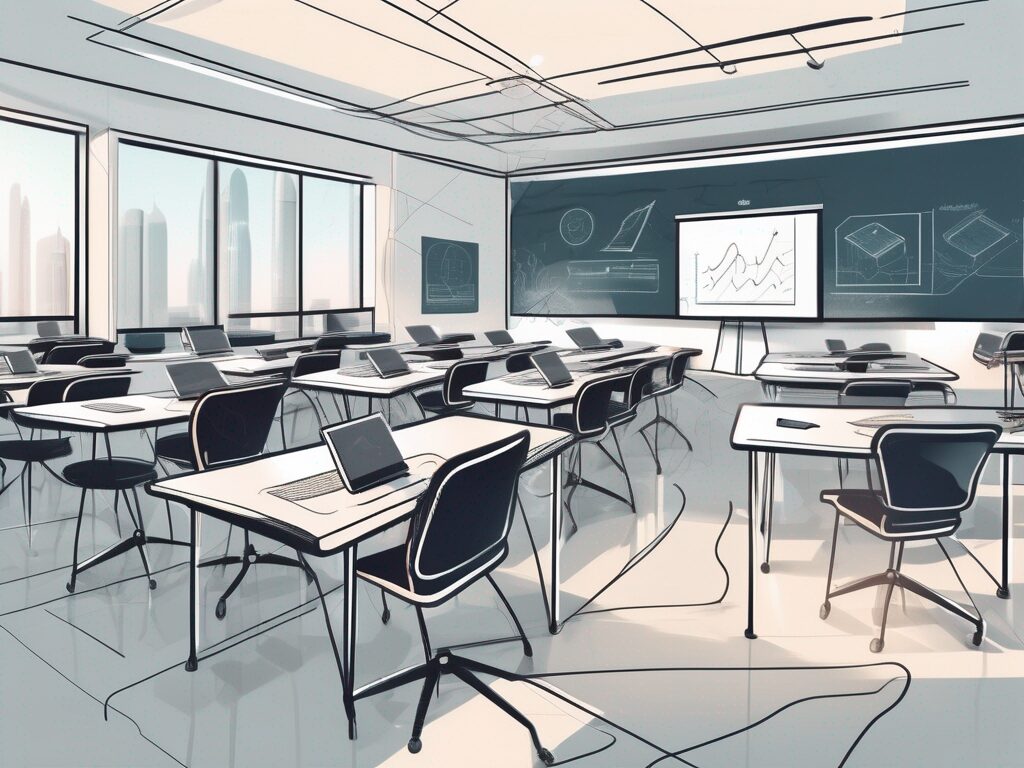In the dynamic world of education, the integration of technology has become a crucial factor in shaping the future of learning. This is particularly true in Dubai, a city known for its cutting-edge technology and innovative approach to education. For those who have earned a Master’s in Education, the challenge lies in effectively utilising technology to enhance the learning experience. In this blog, we will explore four methods that educators in Dubai are using to integrate technology into their classrooms.
1. Interactive Whiteboards
The Power of Visual Learning
Interactive whiteboards have revolutionised the traditional classroom setting by providing a visually engaging platform for learning. These high-tech boards allow teachers to present information in a dynamic, interactive manner. Imagine a geography lesson where students can virtually explore different countries, or a mathematics lesson where complex problems can be solved interactively. It’s a far cry from the static, one-dimensional learning of yesteryear.
Moreover, interactive whiteboards cater to different learning styles. For visual learners, these boards provide a colourful and engaging way to absorb information. For kinesthetic learners, the interactive nature of the boards allows them to physically engage with the material. It’s a win-win situation for all students.
Enhancing Collaboration
Interactive whiteboards also promote collaboration among students. Group activities become more engaging and productive as students can collectively interact with the material on the board. This not only enhances their understanding of the subject matter but also fosters teamwork and communication skills.
Furthermore, these boards can be connected to the internet, allowing for real-time information sharing and collaboration with other classrooms around the world. This global connectivity broadens the students’ perspectives and exposes them to different cultures and ideas.
2. Tablets and Mobile Devices
Personalised Learning
Tablets and mobile devices have become ubiquitous in today’s classrooms. These devices provide a personalised learning experience, allowing students to learn at their own pace and according to their own learning style. For instance, students can access educational apps and e-books that cater to their individual needs and interests.
Moreover, these devices provide instant access to a wealth of information on the internet. This empowers students to take charge of their own learning, fostering a sense of independence and self-motivation.
Enhancing Engagement
Tablets and mobile devices also enhance student engagement. With these devices, learning becomes an interactive and fun experience. Educational games, for instance, can make learning complex concepts more enjoyable and less intimidating.
Furthermore, these devices can be used for multimedia presentations, adding a creative dimension to learning. Students can create videos, podcasts, and digital art, fostering their creativity and technological skills.
3. Virtual Reality (VR) and Augmented Reality (AR)
Immersive Learning Experiences
Virtual Reality (VR) and Augmented Reality (AR) provide immersive learning experiences that can transform the way students learn. With VR, students can virtually explore historical sites, scientific concepts, and even outer space. This immersive experience makes learning more engaging and memorable.
AR, on the other hand, superimposes digital information onto the real world. This can be particularly useful in science and engineering subjects where complex concepts can be visualised in a three-dimensional manner.
Enhancing Understanding
VR and AR can enhance students’ understanding of complex concepts by providing a visual and interactive representation of the subject matter. This can make abstract concepts more tangible and easier to understand.
Furthermore, these technologies can cater to different learning styles. For visual learners, VR and AR provide a visually engaging way to learn. For kinesthetic learners, the interactive nature of these technologies allows them to physically engage with the material.
4. Learning Management Systems (LMS)
Organising and Tracking Learning
Learning Management Systems (LMS) are software applications that allow teachers to organise and track learning. They provide a centralised platform where teachers can upload course materials, assignments, and assessments. Students can access these materials anytime, anywhere, making learning more flexible and convenient.
Moreover, LMS can track students’ progress, providing valuable data that teachers can use to tailor their teaching strategies. This personalised approach to teaching can enhance students’ learning outcomes.
Enhancing Communication
LMS also enhance communication between teachers and students. Teachers can provide feedback on assignments and assessments through the system, and students can ask questions and clarify doubts. This constant communication fosters a supportive learning environment.
Furthermore, LMS can facilitate collaboration among students. They can work on group projects, share resources, and engage in online discussions, fostering a sense of community and teamwork.
In conclusion, technology has become an integral part of education in Dubai. With a Master’s in Education, educators are well-equipped to harness the power of technology to enhance the learning experience. Whether it’s through interactive whiteboards, tablets and mobile devices, VR and AR, or Learning Management Systems, the possibilities are endless. As technology continues to evolve, so too will the methods of integrating it into the classroom.
Advance Your Teaching Career with iQTS at UWE
As technology redefines educational landscapes in Dubai and beyond, the need for qualified educators who can thrive in international classrooms is paramount. The IQTS at UWE offers the International Qualified Teacher Status (iQTS) Programme, specifically designed to elevate your professional credentials. By joining our programme, you’ll not only meet the high standards of international schools but also increase your chances of interview callbacks by 50%. Experience a 45% increase in promotion rates, a 30% salary boost, and become part of a thriving professional community, reducing feelings of isolation. With our flexible online study options, you can seamlessly integrate professional development into your busy schedule. Don’t let the opportunity to become 65% more adaptable to global education systems pass you by. Make Your Next Step towards a transformative career in education with the iQTS at UWE.

